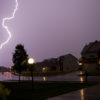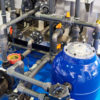How the Pool Energy Law Affects You
THE FLORIDA POOL ENERGY CODE GOES INTO EFFECT MARCH 15, 2012
The simple explanation for this code is: All residential pool pump motors on the circulatory system (attached to your filter) that are 1 HP or greater will need to be changed to variable or 2-speed motors when they need to be replaced.
There are exceptions for motors still under manufacturer’s warranty, but all other motors on the circulatory system of the pool need to be upgraded when replaced.
THIS IS NOT A BAD LAW- IT WILL SAVE YOU MONEY
These new variable speed motors are a huge technological improvement over old induction motors. They will save you money and we guarantee it. If you replace your 1 HP or greater motor with a new variable speed motor Pool Troopers guarantees you will save at least $1000 in energy over a three year period, and we back it up by warranting the motor for the third year ourselves- you can’t lose!
The code also covers other pool equipment, please read on to see the Florida Swimming Pool Associations great detailed explanation of the entire Law.
THE FLORIDA SWIMMING POOL ASSOCIATION HAS PUT OUT THE FOLLOWING DETAILED EXPLANATION OF THE NEW LAW AND COMPLIANCE ISSUES:
The Florida Pool & Spa Energy Law and Code Requirements – what you, your business and your clients need to know in order to be compliant.
1. How did these requirements come into existence?
The Florida Legislature passed an all-encompassing energy bill, House bill 7135, in 2008. Many state legislatures were aware of the California requirements aimed at decreasing the energy required for pools and spas, Florida was no different. Within the original law, provisions for energy efficiency of pool and spa components were included. FSPA worked with legislators to ensure these provisions were consistent with what nationally was becoming the norm and that there was an adequate amount of time allowed for compliance with these new requirements. In addition, FSPA put forth suggested edits to the original law, which were enacted in the 2010 legislative session (House bill 663). Most recently, House bill 849 made final edits, including changing the effective date to December 31, 2011 to coincide with the effective date of the 2010 FL Building Code. The 2010 Florida Building Code has now been set to take effect March 15, 2012.
2. What does the Florida Energy Law require?
House bill 849 provides that pumps, motors, controls, heaters, and portable spas must meet the requirements in the Florida Energy & Conservation Code, which requires the following:
a. Residential filtration pool pump motors cannot be split-phased, shaded-pole or capacitor start-induction run types.
b. If the total horsepower (HP) of a residential filtration pool pump or filtration pool pump motor is one HP or larger than the pump and pump motor must have at least two speeds.
c. Residential pool filter pump controls, for use with a multi-speed pump, must be capable of operating at a minimum of two speeds.
d. Default pool filtration speed must be a speed that results in a flow rate that will NOT turnover the pool in less than six hours, and any high speed override must default back to the pool filtration speed in less than 24 hours. This allows solar pool heating systems to run at higher speeds during periods of usable heat gain.
e. The law contains requirements for pool and spa heating systems, consistent with federal requirements and Florida Building Code requirements that have already been in effect since 2007 and before. Therefore, the requirements found within the Florida law should have no bearing on what is already provided by heater manufacturers. These requirements are:
i. Thermal efficiency of gas and oil-fired heaters must not be less than 78%.
ii. Heat pump heaters shall have a coefficient of performance at low temperature of not less than 4.0 (COP).
iii. Natural and LP gas-fired heaters shall not be equipped with constant burning pilots.
iv. All heaters shall have a readily accessible on-off switch that is mounted on the outside of the heater and that allows shutting off the heater without adjusting the thermostat setting.
f. The law requires portable spas to meet a certain standby power, based on the industry test protocol.
3. Does the law apply to existing pools and spas?
Yes
a. Manufacturers will most likely continue to make single speed pumps and pump motors for non-pool filtration purposes, therefore it is the installers’ responsibility to choose and install a compliant model whenever replacing a pool filter pump or pool filter pump motor. Building departments will have the ability to enforce these requirements on both new and existing residential pools. If a particular building department does not require a permit for a replacement pump or motor on an existing pool, this does not discount that the law and code requires the replacement pump/motor to comply. *Note: If repairing an existing pump or pump motor, an existing single speed pump or motor can still be used, but if it is being replaced, the new requirements kick in.
b. If existing pool filter pump controls are replaced, controls capable of operating at a minimum two-speed are required to be installed, even for single speed pumps.
c. Manufacturers only make pool and spa heaters that meet the efficiency requirements found not only in the Florida law and code, but more importantly, within federal requirements. Therefore, when installing a new or replacement heater, the contractor should only be able to install one that meets the minimum heater requirements laid out in the Florida law and code. However, readily accessible on/off switches are not federally required and a heater must also comply with these additional requirements.
**Note: Enforcement on existing pools will vary, this is where distributors and the industry as a whole must educate each other on the law and encourage compliance – the energy savings benefit the consumer.
4. What if the existing pump or pump motor is under warranty?
If the pump/motor in question is still under warranty and the manufacturer provides the replacement then it is not being sold and replacing it with a single speed pump should be okay. This follows how CA has addressed the same issue. Extended warranties not provided by the manufacturer do not comply as the third party is purchasing the replacement pump/motor.
5. What does the Florida Building Code require?
The 2010 Florida Building Code, within Chapter 4 of the Florida Energy & Conservation Code, will mandate all of the requirements found within the original Florida Energy Law (HB 849 removes the specifics and now requires compliance with the 2010 Code). Chapter 4 will also have additional mandates not found in the law, requiring compliance with national energy standards ANSI/APSP 14 (portable spas) & ANSI/APSP 15 (residential pools and inground spas). These additional requirements consist of the following and only apply to new construction:
a. Pool filter pumps must be sized based on the formula H = C x F2 so that the resulting flow rate will not turn over the pool water volume in less than 6 hours or 36 gpm, whichever is greater. The coefficient C changes based on pool size, with one for pools up to 17,000 gallons and another for pools that are larger. The effect is to limit the performance of single speed pool filter pumps so the residential pool will not exceed public pool turnover flow rates. In many cases, common ½ and ¾ HP pumps move too much water and cannot be used as pool filter pumps. The contractor does not need to go through the formula, but must determine the pool gallons, divide it by 360 minutes, and then select the pump from the database (that is currently being created at APSP) with curve A or C listed flowrate equal to or less than calculated filtration flowrate.
b. A time switch must be installed to allow pool owners to run the pool filtration pump only during the off-peak period.
c. Pool filtration piping must be sized so that the velocity of the water at maximum flow does not exceed 8 feet per second in the return line and 6 feet per second in the suction line. Note: Do not confuse these requirements with ANSI-7 water velocity requirements for entrapment prevention purposes. Must comply with both.
d. Filters (cartridge, sand, and DE) must have a minimum area based on the 6-hour turnover flow rate (pool gallons / 360 minutes).
e. When used, filter backwash valves must be 2 inches or the diameter of the return pipe, whichever is greater.
f. For pool filtration pumps a length of straight pipe that is at least 4 pipe diameters shall be installed before the pump.
g. Directional inlet fittings are required.
h. 18” of pipe, valves, tees, or installed pipe from pool to pad are required to allow for future solar connections.
i. Sweep elbows are encouraged; not required.
6. When do these new requirements go into effect?
The law PREVIOUSLY stated that as of July 1, 2011 manufacturers must comply with the heater, pump and motor, and portable spa requirements. House bill 849 changes this to December 31, 2011 but now the building code is set to go into effect March 15, 2012. With regard to the pump/motor requirements, this means only providing two-speed or greater pumps and motors for residential pool filtration purposes. Most manufacturers’ already comply with this and this does not preclude them from providing single speed pumps and motors for non-filtration purposes. The law does not address compliance out in the field to ensure two-speed or greater pumps and motors are actually installed on residential pools for filtration purposes. That is where the FL Building Code comes in – the new 2010 FL Building Code will require compliance with all pool and spa energy efficiency requirements found in originally in the law, but now laid out in the code. This code goes into effect March 15, 2012.
7. How will I know if a pump or motor meets the new requirements?
All residential pumps/motors used to filter pool water must meet the new requirements. The Florida law and code does not cover pumps and pump motors installed in addition to the pool filtration pump provided the pump is used exclusively for other purposes, such as booster pumps for cleaners, water feature pumps, etc. This applies to auxiliary pumps that include a filter; provided the auxiliary pump filtered flow is not used and not needed to meet the swimming pool’s turnover requirements. The Association of Pool & Spa Professionals (APSP) is in the process of putting together a database of the list of approved two-speed or greater pumps and motors – this should be completed prior to the effective date of the 2010 Florida Building Code. This database will be provided to both Florida contractors and building departments. In the meantime, a good frame of reference for approved pumps and pump motors is the California Energy Commission’s Appliances Database (http://www.energy.ca.gov/appliances/database/index.html).
8. How will I know if my portable spa meets the new requirements?
The portable spa manufacturer must meet the standby power requirement in the Florida law and should be able to provide approved lab documentation to verify a portable spa has been tested to and meets this requirement. In addition, this information is typically documented on the California Energy Commission’s California Energy Commission Appliances Database (http://www.energy.ca.gov/appliances/database/index.html). It will also be provided in the APSP database currently being developed.
9. How will I know if a pool/spa heater meets the requirements?
All pool heaters have had to meet the minimum efficiency requirements for several years and the efficiency should be listed on the heater. In addition, the heater must have readily accessible on/off switch and it cannot be a combination switch that also adjusts water temperature.
10. How will these requirements be enforced?
Enforcement will vary from building department to building department, but that does not change the fact this is the law. Upon the effective date of the 2010 Florida Building Code, building departments will have the authority to enforce these requirements on both new and existing pools and spas for which a permit is issued. Individuals may also report non-compliance to the building department and/or to the Construction Industry Licensing Board. The latter would be either to report a licensed contractor not complying with the law or to report unlicensed activity when someone not licensed, regardless if they are complying with the law, is performing this type of work.
11. What financial assistance is available to consumers who install these energy efficient products?
Currently there is no state or federal assistance; however, utility companies have provided rebates to those who install a two-speed or greater pump/motor. At this time, the only utility company we are aware of offering these types of rebates is Gainesville Regional Utility.
12. Where can I learn more about these requirements?
FSPA has developed several courses on the new energy requirements. These courses can also be offered throughout the State by contacting the FSPA office at 941-952-9293. Additional Energy Information can be found on the FSPA website at https://floridapoolpro.com. Manufacturers of products that meet these requirements also have information that can be found on their websites.



